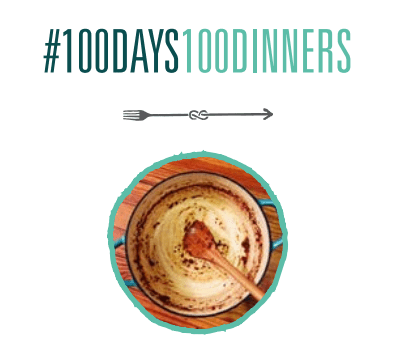 I want to invite you to dinner.
I want to invite you to dinner.
Yes. You.
All of you.
Not at my house…well, not all at the same time, at least. I am inviting you to dinner at your house, in your neighborhood, or somewhere in your city during the first 100 days of the Trump administration. No matter who you voted for…or who your neighbor voted for…we all gotta eat. And unless you’ve made advanced preparations, we all gotta live here for the time being as well.
So, let’s have dinner together.
#100Days100Dinners is for everyone who wants to “do something” about our country right now. So how is gathering around a table going to do something about the mix of emotions, hopes and fears many of us are carrying right now? How is a shared meal going to—as we say at CSA—make radical love visible? I’m not sure, except I know that it at least has that potential. I’ve witnessed it with my own eyes and felt it in my own spirit.
No matter who you voted for…or who your neighbor voted for…we all gotta eat.
At shared tables during my childhood, different religions were shared as easily as different foods. It’s where I learned that friendships can embrace the differences people embody without needing to erase them. Shared tables in my adulthood have been deliberate, delicious moments to pause, connect, laugh and remember the importance of truly being with one another.
I don’t exactly understand the spiritual magic of the table that makes it a potential place of healing, connection and renewal. But I think Jesus understood something of this power—hence the eucharistic ritual of gathering around a table. Jesus chose such a common, universal, and yet culturally bound practice—a meal—as a way of remembering his life and teachings. Meals at my house may not look like meals where you live, yet sharing a meal with family, friends, strangers or neighbors is a nearly universal human practice. The table can look radically different depending on family, culture, place and historical time period, and the table can carry both meaning and memories—and still provide a setting for physical, social, emotional and spiritual nourishment for those who come hungry.
Jesus wasn’t just asking us to engage in spiritual reflection when gathering around the table, although we often reduce the table to that. Jesus, having grown up in a family, engaged in community and lived as a spiritual leader, knew that sharing a table also meant sharing moments of conflict, betrayal, awkward silence, disappointment, and joy. The way we are treated at the dinner table as children sticks with us for years. The joy that comes from setting the table on holidays can make hours of travel or cooking worthwhile. The complexities of conversation around the table can change relationships forever. The household table is potentially fertile soil for personal and relational growth.
The shared table is so much more than just a meal or a ritual. It is a place where we can, if we choose, accept the invitation to remember Jesus and choose his ways as we pass the bread and the broccoli. The dinner table isn’t so much a break from life, but an opportunity to practice life together through shared words, space and sustenance. That’s the spiritual magic. The spiritual magic of opportunity—of one more time—of another chance. That sounds kind of like resurrection.
The dinner table isn’t so much a break from life, but an opportunity to practice life together through shared words, space and sustenance.
This resurrection opportunity is present at every shared meal—to show generosity by offering the last roll, show love by listening to a story and responding with kindness, share a toast and celebrate someone at the table who may not know you care. These are the opportunities—the profoundly spiritual and human moments of magic—that can take place during such an ordinary practice as a meal. Jesus could have asked us to remember him by participating in some elaborate ritual or in some already recognized religious practice—instead, he chose a meal. Why? Maybe because with or without the prayer or rituals, each meal is a new opportunity to remember him as we pass the food and chew and swallow and listen and talk?
We at CSA have partnered with #100Days100Dinners to invite you to host a dinner, or pull up a seat to a table during this national time of transition—so that we as Christians would be people of action. Yes, the action of marching and engaging the political process, but also of creating the sacred space of a shared meal. Not to convert or to convince, but to love.
Ready to cook something up? Go to #100Days100Dinners.us and sign up to host a dinner, or find a dinner to attend. We need you at the table.
Micky ScottBey Jones—the Justice Doula—is a womanist contemplative activist, healer, nonviolent direct action organizer and consultant who facilitates conferences, workshops, pilgrimages, retreats and online conversations. She writes & speaks on a variety of topics including healing justice, communal self-care, contemplative activism, intersectionality and theology from the margins. Micky has an M.A. in Intercultural Studies and is an Associate Fellow of Racial Justice with Christians for Social Action. She is the Director of Healing Justice at Faith Matters Network and an activist-in-residence at Scarritt Bennett Center in Nashville, TN. Micky was named one of the Black Christian leaders changing the world in Huffington Post. You can interact with her work and collaborations at MickyScottBeyJones.com.


